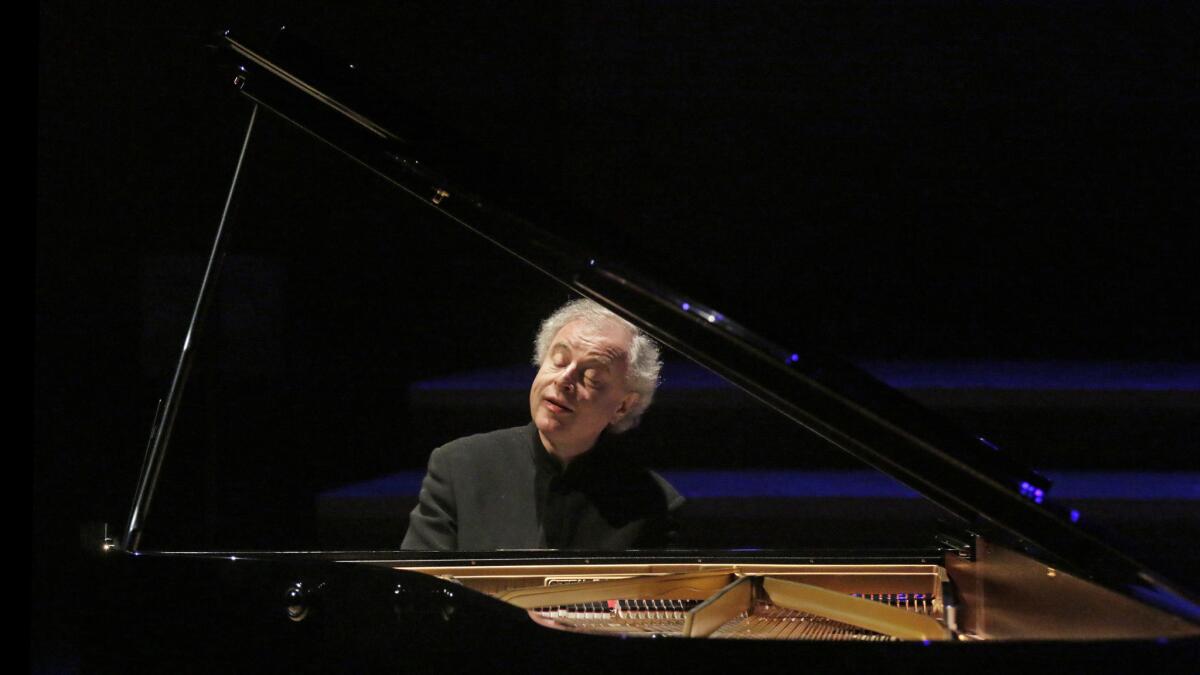András Schiff slyly and expertly plays late sonatas of legends

- Share via
Given music’s power to produce emotional attachment, the death of a musical style can call into devastating question our mortality. But this is where András Schiff is headed.
A pianist of rare insight who has served as a spiritual guide to Beethoven and Bach with his regular visits to Walt Disney Concert Hall the last 11 years, Schiff returned Wednesday night for the first of three recitals that will cover the last three sonatas of Haydn, Mozart, Beethoven and Schubert.
These are the four composers who, in late 18th century and early 19th century Vienna, created and then finished off the style that became the foundation for modern classical music. Since their final piano sonatas reveal the heights to which they all rose, the concerts in the hands of a pianistic purist such as Schiff have the potential to be reverently moving occasions.
FULL COVERAGE: Inside the Los Angeles Philharmonic
So, there he was, Wednesday, this cerebral 61-year-old Hungarian pianist for whom his devoted followers make pilgrimages to hear, a spiritual guide to be sure, as trickster too.
He began with Haydn’s 50th piano sonata — its daunting full title is Sonata in C Major, Hob XVI:50 — punching out the staccato opening notes with forefingers like Chico Marx. He even looked, from his profile, like Chico. He has mastered that wry, humorously self-satisfied, hallmark Marx Brothers expression.
The performance was deliciously hilarious, such as when Schiff, with expert comic timing, put just the slightest extra emphasis on what Haydn wanted you to hear as a wrong note, only to, through harmonic sleight of hand, resolve.
Schiff was, of course, no Chico. He played with breathtaking beauty. Every note was exquisitely rounded, the dynamics so subtly handled that the piano sounded not like struck strings but bowed catgut, hit temple bells or wind blown through wood or precious metal.
These were not Haydn’s sounds; the keyboards of the composer’s time were far more fragile in their tone. But the playing was period practice in remarkable ways. Haydn’s late music contains the wry observations of a lifelong trickster. Schiff let none of those tricks pass unnoticed and he added a few his own in little delightful embellishments (as Papa Haydn would have expected performers to do in his day).
Haydn, who died at age 77, lived a far longer life than the other three Classical-period icons. Schiff showed why. He played the sonata with exactly the right wryness to demonstrate that longevity does not favor Type A personalities. You can’t get too worked up.
Beethoven got too worked up. His Sonata, Opus 109, is not quite a leave taking, but it is getting there. Moments of ethereal lyricism might be broken by sudden fits of vehemence or ghostly hauntings. Through struggle, he arrives at visions of nirvana.
Sign up to receive our Essential Arts & Culture Newsletter
This is territory Schiff has long explored, and he let Beethoven’s sonata unfold as though inside a tormented genius’ brain.
Mozart and Schubert did not have authentic late periods. They were cut down by disease in their early 30s, and Mozart’s third-to-last sonata has little to indicate late style. It is a simple sonata, the one every pianist learns first. Millions of amateurs have played it.
Wednesday’s audience was utterly quiet, transported, but during Mozart’s C-Major sonata a woman near me quietly hummed. I’m sure it was involuntary and she didn’t know she was doing so. Maybe that’s why it was a welcome intrusion, conveying a sense of communality in an uncommonly quiet crowd.
But for all of us who thought that we had learned to play at least one Mozart sonata adequately, Schiff was there to show us what we were missing.
He brought out inner details that gave piquancy to harmonies that are as conventional as they might first appear. As in the Haydn, he exquisitely decorated the melodic lines when sections repeated to add complication. He found song where others find formula; he conveyed song where others play scales.
Schubert’s Sonata in C Minor, D. 958, was something else in Schiff’s hands — a shocking psychodrama. Schubert could be a repeating machine, falling into rhythmic grooves. For Schiff, so gentle and maturely far-seeing elsewhere, these grooves were the occasion for fury.
He attacked the sonata, but he also made more vivid than I have ever heard in this sonata the astonishing range of expression when a restless Schubert shockingly changes gear. Schiff was in the kind of control that no matter how extreme his range of musical emotions, he never lost the long line. It was a great and important performance.
Schiff’s encores were a Schubert Hungarian melody and an impromptu, along with a late, transcendentally played bagatelle of Beethoven. He returns to Disney on March 4 for the four composers’ penultimate sonatas and in October for their final ones.
More to Read
The biggest entertainment stories
Get our big stories about Hollywood, film, television, music, arts, culture and more right in your inbox as soon as they publish.
You may occasionally receive promotional content from the Los Angeles Times.











